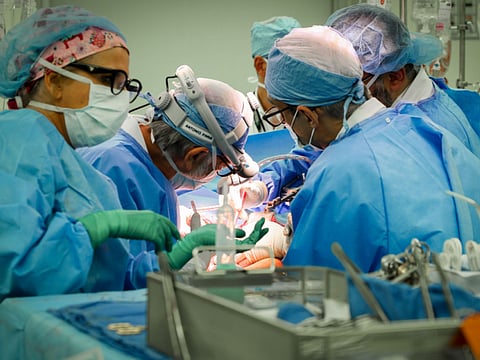Organ donation in the UAE: All you need to know
The UAE passed its first law on organ transplants in 1993

The video of a Saudi boy dancing in a hospital went viral on social media, and was published by the Saudi Ministry of Health on its Twitter account on Tuesday. The young boy had undergone a successful kidney transplant surgery, dancing to show his joy after being hooked to dialysis machines for most of his life.
Organ donation has saved millions of lives around the globe and a single healthy person could save as many as eight people with various organ needs.
While there is no nationwide registry for UAE organ donors currently, this is soon to change. In February, the Ministry of Health in the UAE announced plans to list organ donor status on Emirates IDs under the new National Programme for Organ Transplantation. There are also plans in place for a national transplant list with the details of the patients requiring organs.
UAE regulations on organ donation
» Any person residing in the UAE from any nationality can donate organs through the approved and legal channels in the UAE.
» Current law was passed by presidential decree in September 2016, and took effect in March 2017. It provides definition and criteria for brain death, including the requirement for two physicians and a neurologist that the patient does not have blood flow to the brain.
» Transplants are allowed for solid organs including heart, kidneys, liver, lungs, pancreas, intestine, and thymus, and for tissues including bones, tendons, cornea, skin, heart valves, nerves and veins.
» Sale of human organs and tissues and their advertising for transplantation purposes are banned.
» Donation of organs and tissues by a living person can only be made if the donor is legally competent, and to a recipient related within the fourth degree or between couples married for at least two years.
» Bone marrow can be donated by minors if it is transplanted in parents, siblings or children of the donor. Written consent from the donor’s guardian is required.
» People can record their decision about becoming an organ and tissue donor for transplantation after death on the Emirates Identity Card or any other documents. They can also unconditionally backtrack on their decision.
Consent
For a deceased donor who did not register their wish, the consent of a resident relative of the donor is required. This consent is invalid if the deceased expressed a refusal to donate while alive.
A donor may change his mind before removing an organ, a part of it or a tissue, but may not recover a donated organ once it is removed. The identity of both the donor and recipient must remain confidential by law. Violation of this will invite fines and prison terms.
Fines
Surgeons who extract organs or tissues by force or fraud will face life imprisonment and at least a Dh20-million fine if the surgery leads to the death or complete disability of the person whose organ or tissue is removed.
Process of organ donation
✓ Once a patient is identified as brain-dead, the National Transplant Committee deploys a trained sub-group of professionals to inform the family of the deceased, and obtains the required consent.
✓ The health facility then contacts all organ transplantation centres in the UAE and regionally to see if any of the available organs are required by patients on their waiting list — and if there is a potential match given the donor’s blood type, HLA type, age and weight.
✓ The transplant centre sends out a team of two surgeons and a nurse to recover the organ.
✓ If the facility is more than 40 minutes away by road, the hospital seeks the help of the Abu Dhabi Police air ambulance to hasten the transport of harvested organs.
✓ Meanwhile, the matched recipient is asked to come in to the transplant facility to be tested again, and to prepare for a possible transplant surgery.
✓ Once the organs are harvested, the rush for time begins.
✓ While kidneys remain viable for transplant up to 24 hours after harvesting, a heart must be transplanted within four to six hours, lungs within six to eight hours, and livers within eight to ten hours after harvesting.
✓ After the organs are brought in, surgical teams set to work. The time required for the transplant procedure varies.
The UAE currently has three certified centres for organ transplantation at the Cleveland Clinic Abu Dhabi, the Shaikh Khalifa Medical City and the Mediclinic City Hospital Dubai.
Each maintains its own waiting list of patients who require organ transplants, including vital details to make a match, such as the patient’s blood type, HLA type (antigens on white blood cells that determine tissue compatibility for organ transplantation), age and weight.
In addition, the National Transplant Committee coordinates with organ transplantation centres across the Gulf countries for organs.
Sign up for the Daily Briefing
Get the latest news and updates straight to your inbox


